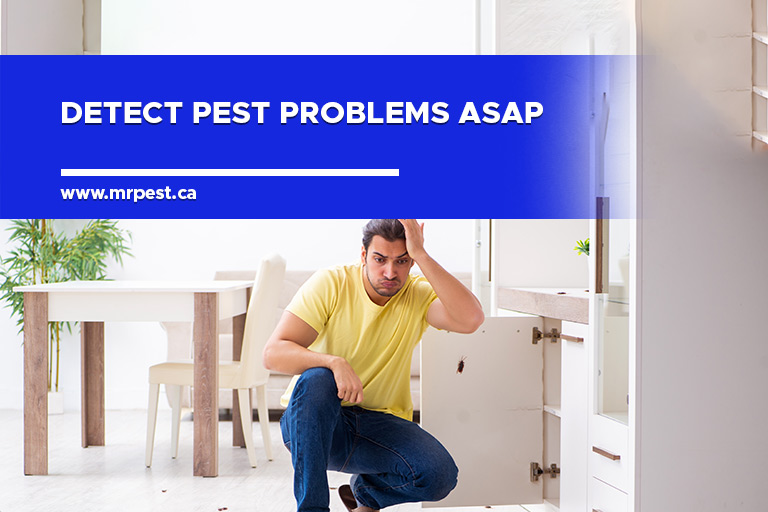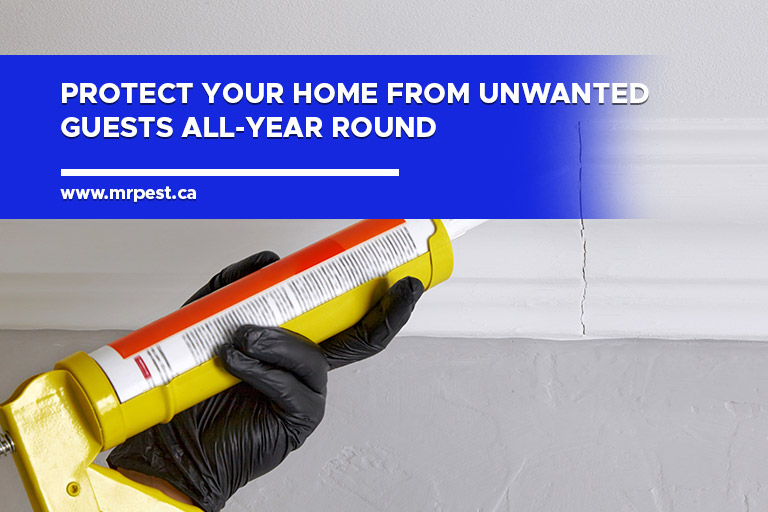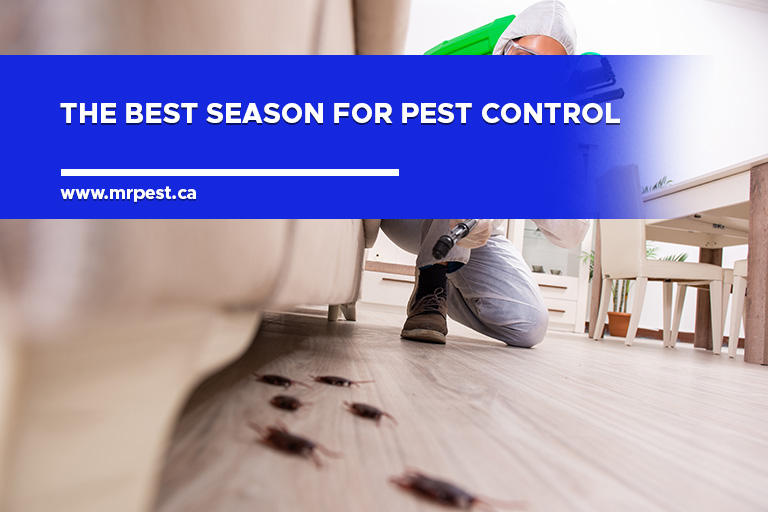Pest management is a crucial aspect of maintaining a healthy and comfortable living environment. Understanding the best season for pest control can significantly impact the effectiveness of your efforts in keeping pests at bay. In this guide, we’ll delve into the importance of timing in pest control and explore strategies tailored to different seasons.
Understanding Pest Management by Season
Pest management is a dynamic process that requires careful consideration of seasonal factors. Each season brings its own set of challenges and opportunities when it comes to controlling pests effectively. Understanding how pests behave and interact with their environment during different seasons is essential for developing proactive pest control measures.
Let’s delve into the intricacies of pest management by season and uncover the secrets to maintaining a pest-free environment year-round.
Best Time for Pest Control

Timing plays a critical role in the effectiveness of pest control efforts. Knowing the best time to implement pest control measures can make a significant difference in preventing infestations and minimizing pest-related issues. Understanding the factors that influence pest activity and behaviour during different times of the year can help homeowners develop proactive strategies to keep pests at bay.
Tips for Determining the Best Time for Pest Control:
- Monitor Pest Activity: Regularly inspecting your property for signs of pest activity can help identify peak times when pests are most prevalent.
- Consider Seasonal Patterns: Take into account seasonal changes in temperature, humidity, and natural cycles to anticipate fluctuations in pest populations.
- Consult with Pest Control Professionals: Seeking advice from pest control experts can provide valuable insights into local pest trends, assess pest risks and develop comprehensive treatment strategies tailored to your property.
- Evaluate Environmental Conditions: Assessing environmental factors such as weather conditions, vegetation, and nearby habitats can help determine optimal times for pest control interventions.
- Coordinate Treatments Proactively: Plan pest control treatments to coincide with periods when pests are most vulnerable or active, maximizing the impact of your efforts.
Effective pest control timing involves taking proactive measures to prevent infestations before they occur. By addressing potential pest issues before they escalate, homeowners can avoid costly damage and inconvenience. Regular inspections and proactive maintenance can help identify and address pest vulnerabilities before they become major problems.
Pest Control Timing Considerations
Timing is a critical aspect of effective pest control, influenced by various factors that homeowners must consider. Understanding these considerations enables informed decisions regarding the timing and frequency of pest control treatments. Flexibility and adaptability are essential when developing pest control strategies, as conditions may change over time.
Effective pest control timing requires careful consideration of several key factors:
- Weather Conditions: Changes in weather patterns, including temperature fluctuations, precipitation variations, and shifts in humidity levels, can profoundly influence pest behaviour and activity patterns. Monitoring these weather fluctuations enables homeowners to anticipate potential pest outbreaks and take proactive measures to mitigate their impact.
- Pest Life Cycles: Each pest species undergoes a distinct life cycle, comprising stages such as egg, larva, pupa, and adult. Familiarizing oneself with the life cycles of target pests empowers homeowners to pinpoint the most vulnerable stages for effective treatment, disrupting their reproductive cycles and curtailing population growth.
- Environmental Changes: Urban development, alterations in landscaping practices, and modifications to natural habitats can all exert significant influence on pest populations and distribution patterns. By staying attuned to environmental shifts, homeowners can adapt their pest management strategies to address evolving pest dynamics effectively.
- Seasonal Trends: Pest activity exhibits discernible fluctuations throughout the year, with certain pests displaying heightened prevalence during specific seasons. Understanding these seasonal trends enables homeowners to anticipate potential pest infestations and implement preventive measures tailored to each season’s unique challenges.
- Local Pest Species: Identifying the predominant pest species in one’s locality is paramount for devising targeted pest control measures attuned to local conditions. By familiarizing themselves with the behaviour and habitats of local pests, homeowners can implement proactive strategies that specifically address prevalent pest species in their area.
- Regulatory Considerations: Adherence to local regulations and compliance with restrictions governing pest control products and application methods are imperative for ensuring safe and effective pest management practices. Remaining abreast of regulatory guidelines enables homeowners to navigate the complexities of pest control legislation while safeguarding environmental and human health.
- Property-Specific Factors: The unique characteristics of each property, including landscaping features, structural vulnerabilities, and storage practices, can significantly influence pest attraction and accessibility. By conducting thorough property assessments, homeowners can identify and address specific factors that may contribute to pest infestations, implementing tailored solutions to fortify their defenses against unwanted invaders.
By considering these pest control timing considerations, homeowners can develop proactive strategies to address pest issues effectively and minimize the risk of infestation. Adjusting treatment schedules and techniques in response to changing conditions ensures ongoing protection against pests and promotes a healthy living environment.
Seasonal Pest Prevention Strategies

Implementing seasonal pest prevention strategies is key to maintaining a pest-free environment year-round. From sealing entry points to eliminating standing water, each season presents unique challenges that require tailored approaches to pest control. By understanding the specific threats posed by pests during each season, homeowners can develop proactive strategies to mitigate risks and protect their homes.
Tailoring Pest Control Strategies for Different Seasons
Spring Pest Control Strategies
Spring brings warmer temperatures and increased pest activity. Implementing preventative measures such as sealing cracks and crevices can help deter pests from entering your home as they become more active in search of food and shelter. By addressing pest vulnerabilities early in the season, homeowners can prevent infestations before they occur.
Summer Pest Control Strategies
Summer months often see a surge in pest populations, including ants, mosquitoes, and flies. Implementing outdoor pest control measures such as removing standing water and maintaining landscaping can help minimize pest activity around your property. Regular maintenance and vigilance are key to preventing summer pests from taking hold in your home.
Fall Pest Control Strategies
As temperatures begin to drop in the fall, pests such as rodents and spiders may seek refuge indoors. Conducting thorough inspections and sealing potential entry points can help prevent pests from gaining access to your home during the colder months. By fortifying your home against fall invaders, you can enjoy a pest-free environment throughout the season.
Winter Pest Control Strategies
While pest activity may decrease during the winter, certain pests such as rodents may still pose a threat to your home. Winter-proofing your property by sealing gaps and ensuring proper insulation can help keep pests out and maintain a pest-free environment. By taking proactive measures to address winter pest vulnerabilities, homeowners can safeguard their homes against cold-weather invaders.
Timing is indeed crucial in the realm of pest control. By grasping the significance of addressing pest issues in sync with the seasons and applying tailored strategies accordingly, homeowners can fortify their properties against unwelcome intrusions throughout the year.
For comprehensive and reliable pest control services in the Barrie area, look no further than Mr. Pest Control. Our team of experienced professionals is equipped with the knowledge and resources to address all your pest control needs promptly and effectively.
Don’t allow pests to overrun your home and compromise your family’s comfort and safety. Take the proactive step today by reaching out to Mr. Pest Control at 705-739-7378. Let us help you reclaim your home from the clutches of pests and ensure a tranquil living environment for you and your loved ones.



